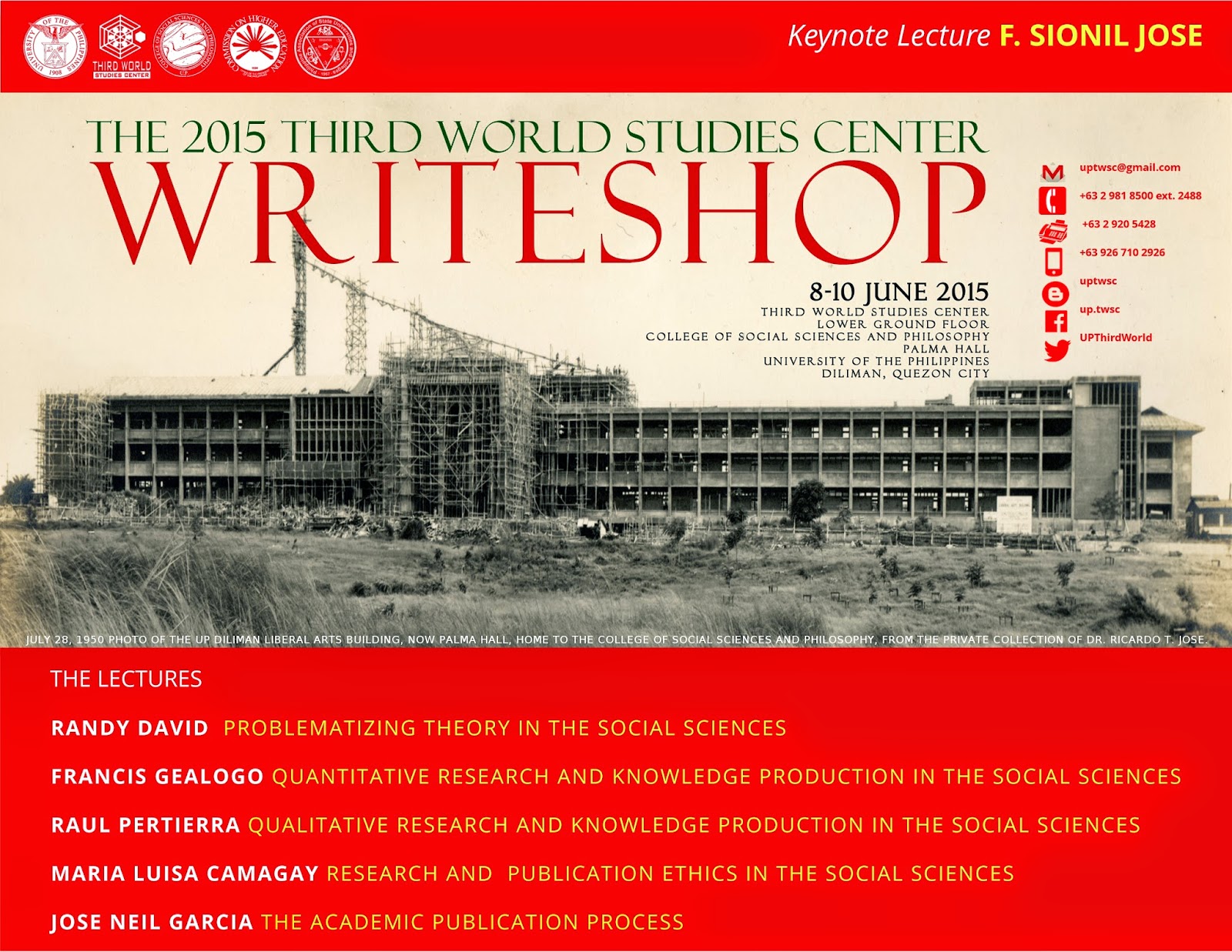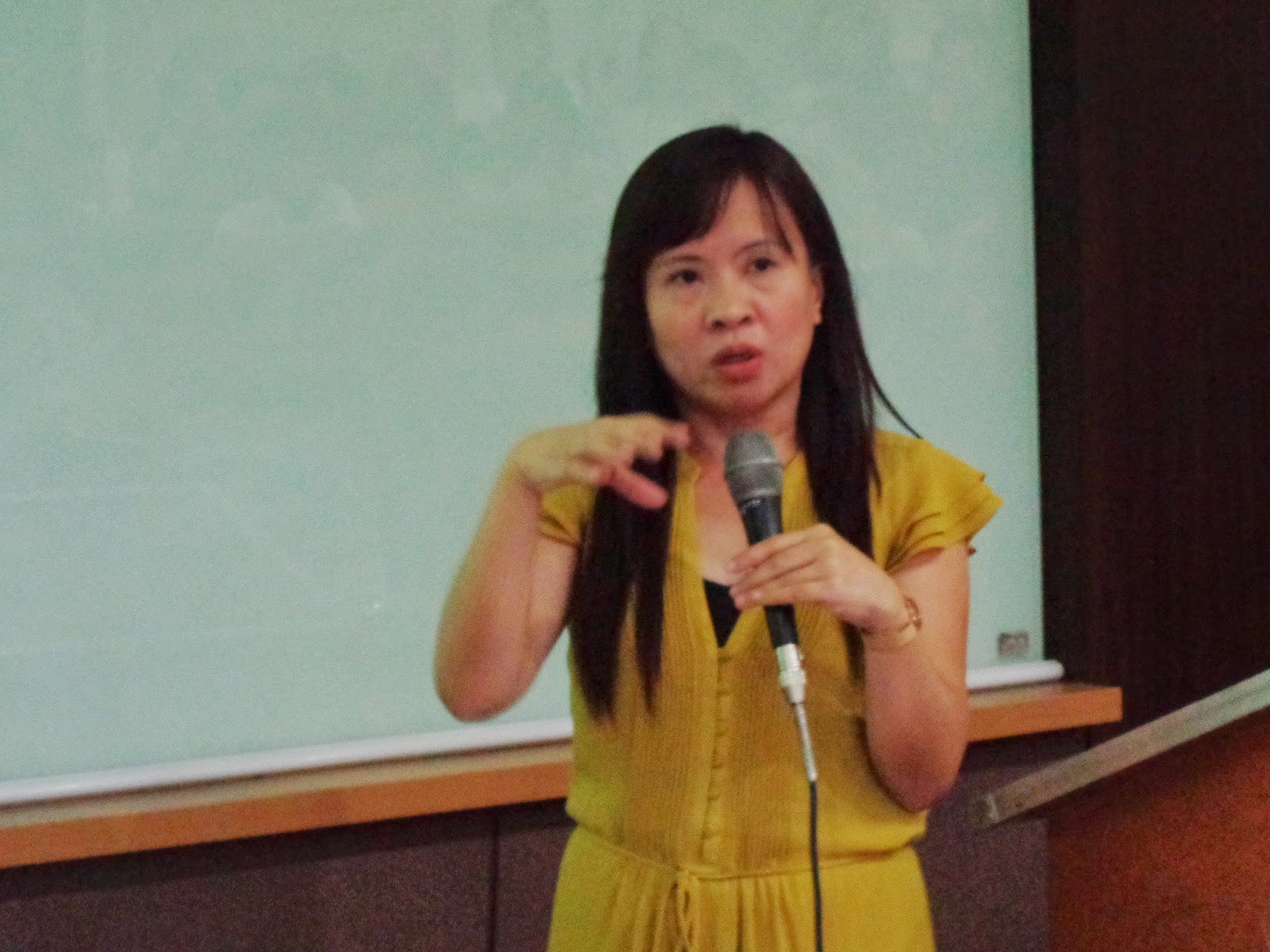CALL FOR APPLICATIONS
The 2015 TWSC Writeshop
Third World Studies Center, Lower Ground Floor,
College of Social Sciences and Philosophy,
Palma Hall, University of the Philippines, Diliman, Quezon City
8-10 June 2015
The Third World Studies Center (TWSC) launches the 2015 TWSC Writeshop in continuing its commitment to build the capacity of early career researchers, junior faculty members, and graduate students in the social sciences. Envisioning itself as a premiere social science research center in the College of Social Sciences and Philosophy, University of the Philippines-Diliman, the TWSC continues to develop critical, alternative paradigms to promote progressive scholarship by undertaking pioneering research and publishing original, empirically-grounded, and innovative studies. The 2015 TWSC Writeshop serves as a dais linking academic research and publication, where select participants are not only given the opportunity to interact with experts from the academe and the publishing industry, but also to produce a publishable manuscript for the TWSC’s internationally refereed and CHED-accredited (A-2, Very Good - Excellent) journal Kasarinlan: Philippine Journal of Third World Studies.
In 2010, the TWSC conducted its pilot research workshop entitled “Writing for Social Sciences Research” that presented the rudimentary process of academic research and writing in the social sciences for UP Diliman social science students. In 2012, it held its second research workshop, “Multidisciplinary Perspectives and Methodologies in the Social Sciences” that centered on multidisciplinarity and theoretical and methodological training within and outside the social sciences. In 2014, the TWSC launched “The 2014 UP TWSC Writeshop” with the belief that if one is to commit to the changing zeitgeist/sociocultural agenda of research, s/he has to effectively contribute to the body of knowledge in her/his interest, to establish networks with scholars with similar research interests, and to obtain critique for the continuous improvement of one’s research output. The 2015 TWSC Writeshop sustains this academic tradition.
The 2015 TWSC Writeshop will feature academic lectures; small group discussions with journal editors; and a plenary presentation as culminating activity. The lectures encompass: 1) problematizing theory in the social sciences; 2) the contribution of quantitative research to knowledge production in the social sciences; 3) the contribution of qualitative research to knowledge production in the social sciences; 4) research and publication ethics in the social sciences; and 5) the academic publication process. In seeing through the TWSC Writeshop’s goal in equipping successful applicants, who would then be called Writeshop Fellows, the Writeshop extends to the publication process and concludes with the publication of the finished manuscripts in a special issue in Kasarinlan.
Who may apply
There will only be ten (10) successful applicants who will be called Writeshop Fellows. Applicants can be social science graduate students, early career researchers, and junior faculty members from any Philippine higher education institution. Applicants who have not yet participated in previous TWSC writeshops will be prioritized.
What to submit
Applicants must be able to submit the following to uptwsc@gmail.com on or before 20 March 2015:
1. An unpublished article, authored solely by the applicant, with a minimum of 4,000 words, an abstract and a list of references, that can be developed into a full-length article for publication in the Center’s internationally refereed and CHED-accredited (A-2, Very Good - Excellent) journal Kasarinlan: Philippine Journal of Third World Studies. Submission must conform to the publication format of the journal (http://journals.upd.edu.ph/index.php/kasarinlan/information/authors). The draft article must demonstrate theoretical rigor and be empirically sound or based on actual research. Submissions will be plagiarism-checked. The submission must conform to the template downloadable here: http://goo.gl/F7GgY7.
2. Soft copy of latest curriculum vitae with references.
What to expect after submission of requirements
1. All submissions will undergo plagiarism check by the Kasarinlan editorial staff. Submissions without plagiarized contents will undergo preliminary editorial evaluation by the Kasarinlan editorial staff. Ten submissions will be selected, with graduate students, early career researchers, and junior faculty members to be given priority.
2. The ten applicants whose submissions were selected will be notified by email, including the terms of reference (TOR) for the Writeshop. They must convey their full understanding, agreement, and acceptance of the TOR by sending the signed TOR to uptwsc@gmail.com.
3. There is no registration fee. Successful applicants based outside of Metro Manila may apply for subsidies, in the forms of per diem and reimbursed travel expenses subject to government accounting rules. Those who would like to avail of the above subsidies must send a signed letter addressed to the Director, Dr. Ricardo T. Jose to uptwsc@gmail.com, with clear justification on why they are requesting for such.
What to expect during the writeshop
Day 1
Keynote lecture by F. Sionil Jose, National Artist
Introduction of Writeshop Fellows
Module 1 Ano’ng problema mo?: Problematizing theory in the social sciences by Randy David, Professor Emeritus, Department of Sociology, University of the Philippines Diliman
Module 2 Ano’ng kuwento ng kuwenta mo?: Quantitative research and knowledge production in the social sciences by Francis Gealogo, Associate Professor, Department of History, Ateneo de Manila University
Module 3 Ano’ng kuwenta ng kuwento mo?: Qualitative research and knowledge production in the social sciences by Raul Pertierra, Professorial Lecturer, Department of Sociology and Anthropology, Ateneo de Manila University
Day 2
Module 4 Ano’ng paki mo?: Research and publication ethics in the social sciences by Maria Luisa Camagay, Professor, Department of History, University of the Philippines Diliman
Module 5 So, ano na?: The academic publication process by Jose Neil Garcia, Director, University of the Philippines Press
- Non-blind peer review in the form of small-group discussions with assigned journal editors
- Culminating activity: Plenary presentation of participants
- Awarding of certificates
1. Ano’ng problema mo?: Problematizing theory in the social sciences
The lecture broadly seeks to rethink the problematization process in social science research by renewing appreciation for and rethinking the import of theorizing in the social sciences. Zooming in on producing a publishable output with rigor in theory use, the lecture is deliberate in also giving critical and constructive inputs on the Writeshop Fellows’ theoretical and analytical concepts, in the form of a collegial academic exercise.
2. Ano’ng kuwento ng kuwenta mo?: Quantitative research and knowledge production in the social sciences
The lecture broadly seeks to give fresh perspectives on quantitative studies and how they expand—as opposed to limit to numbers and figures—social science analysis. It also seeks to give a balanced perspective on the strengths and weaknesses of quantitative approaches to inculcate meaningful appreciation and applied knowledge in producing a quantitative research publication. The lecture also entails giving critical and constructive inputs on the Writeshop Fellows’ methodological concepts, procedures, and analyses in the form of a collegial academic exercise.
3. Ano’ng kuwenta ng kuwento mo?: Qualitative research and knowledge production in the social sciences
The lecture broadly seeks to give fresh perspectives on qualitative studies and how they meld subjectivities with rigor in social science analysis. It also seeks to give a balanced perspective on the strengths and weaknesses of qualitative approaches to inculcate meaningful appreciation and applied knowledge in producing a qualitative research publication. The lecture also entails giving critical and constructive inputs on the Writeshop Fellows’ methodological concepts, procedures, and analyses in the form of a collegial academic exercise.
4. Ano’ng paki mo?: Research and publication ethics in the social sciences
The lecture seeks to question “ethics as a given” in social science research and probe established and contemporary ethical practices on conceptualizing, carrying out, and disseminating research in the social sciences. It also seeks to orient the participants to the publication process and its imperative ethical practice. The lecture also entails giving critical and constructive inputs on the Writeshop Fellows’ ethical research conduct and writing practice in the form of a collegial academic exercise.
5. So, ano na?: The academic publication process
The lecture seeks to give participants a grounded appreciation for academic publishing in the social sciences. It seeks to serve as guide on what they can expect in the publication process. The lecture will be followed by an open forum where the Writeshop Fellows can further engage the speaker on a discussion about academic publication.
Upon completion of the Writeshop, the Fellows are expected to: 1) have an increased awareness of academic publishing; 2) have an increased awareness of the publication process; and 3) continue their engagement with the TWSC for possible publication of their manuscript in Kasarinlan.
What to expect after the writeshop
June 24, 2015
Deadline of first revision (two-week timeframe)
July 8, 2015
Notify authors of editorial evaluation of revisions: Further revisions or copyediting
July 22, 2015
Deadline of final revision (two-week timeframe)
August 5, 2015
Notify authors whose articles will be published in Kasarinlan
For inquiries:
University Research Associate
Third World Studies Center
University of the Philippines-Diliman
Lower Ground Floor, Palma Hall
University of the Philippines
1101 Diliman, Quezon City
E-mail: uptwsc@gmail.com
Telephone: +63 2 981 8500 ext. 2488
Telefax: +63 2 920 5428
Mobile: +63926 710 2926
Please click here for CHED endorsement.
Please click here for Philippine Association of State Universities and Colleges advisory.

































